On October 25, 2023, Vertiv officially unveiled its first-ever uninterruptible power supply (UPS) and fuel cell integration during the new Customer Experience Center opening in Delaware, OH. This event marks Vertiv as a pioneer in combining UPS systems with fuel cell technology, setting a benchmark for innovative and low-carbon backup power solutions.
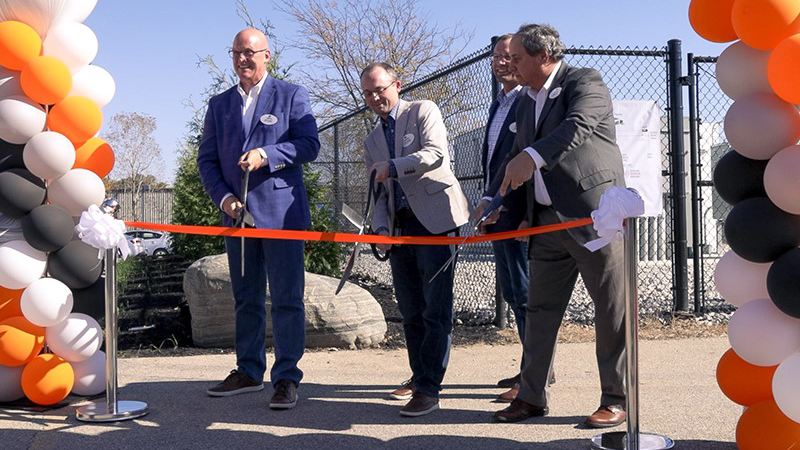
The opening of the facility, attended by key representatives of the Delaware community in Ohio and Vertiv, showcased the ongoing need for innovative energy solutions powering data centers and mission-critical facilities.
The Changing Landscape of Power Systems
With the advancements in AI, machine learning, and other high-performance computing applications, the demands for stable and robust power generation in data centers have soared. As Vertiv Senior Vice President for Global AC Power Line of Business Leader Kyle Keeper has put it during the opening of the Customer Experience Center in Delaware, OH:
The way power and thermal management systems for data centers and other mission-critical facilities are designed is going to change. They are already changing, and our customers are coming to us to figure out how to go about it, what is possible now, what is going to be possible three years from now, and a lot of the work that we are going to do here with this facility is going to enable those conversations.
Fuel Cell Technology Overview
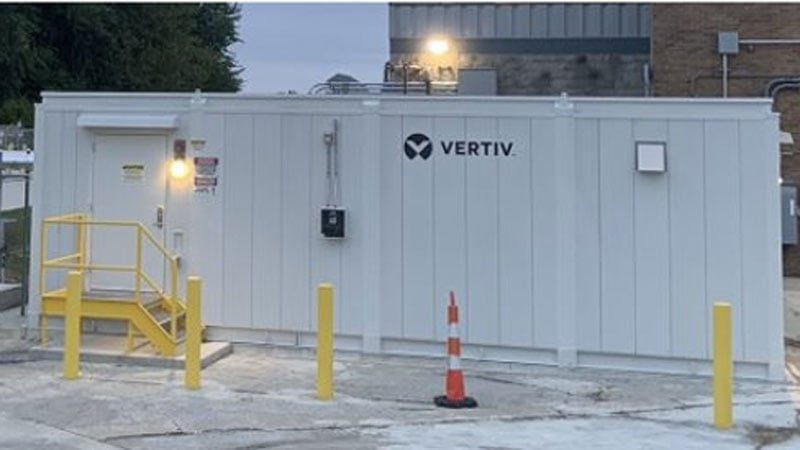
Fuel cell technology generates power by combining hydrogen and oxygen through an electrochemical reaction. It produces electricity, heat, and water and can provide continuous power without the need for recharging as long as hydrogen is available. For backup power applications, hydrogen fuel cells are seen as a great option to replace diesel generators in data centers as they can help reduce carbon footprint while ensuring stable and reliable power generation. It promotes the following:
- Low-carbon future: Fuel cells can produce electricity with lower pollutants compared to combustion-based power sources, especially if using “green hydrogen.” As this technology helps reduce reliance on natural gas and diesel-powered generators, it can also lower the carbon footprint of data centers, contributing to environmental sustainability.
- Energy efficiency: Fuel cells are capable of exceeding 60 percent efficiency at converting chemical energy into electrical energy, while traditional generators are only around 30 percent efficient.
- Enhanced power reliability: The dependable power output of fuel cells ensures that data centers maintain critical operations without interruption, a vital component of digital infrastructure resilience.
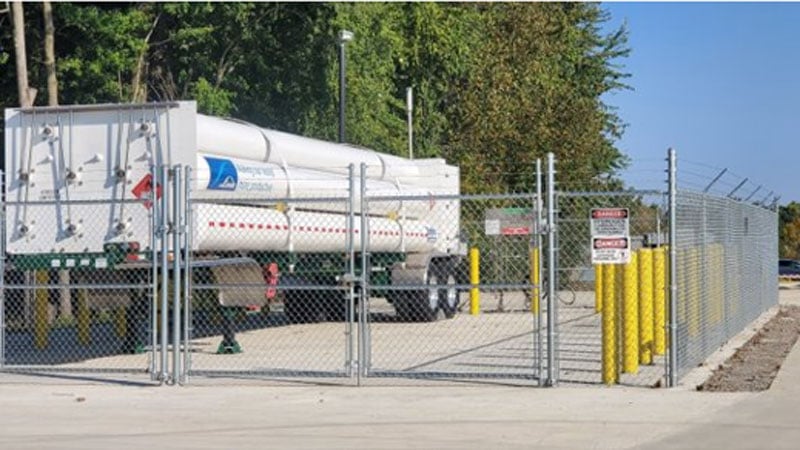
Vertiv™ Liebert® EXL S1 With Fuel Cell Integration
Vertiv™ Dynamic Power includes the Vertiv™ Liebert® EXL S1, which, when integrated with fuel cells, is an example of the "Bring-Your-Own-Power" (BYOP) innovation. This solution combines multiple energy sources, including alternative energy sources, to create an "always-on" microgrid to help support grid independence and address availability changes.
Vertiv™ Liebert® EXL S1 With Fuel Cell Integration Overview
The Vertiv™ Liebert® EXL S1 UPS is a monolithic, transformer-free UPS with a full IGBT three-level topology, a double conversion efficiency of up to 97 percent, and intelligent paralleling to optimize efficiency at partial load, promoting running cost savings. It has also exceeded the Tier IV data center power chain availability.
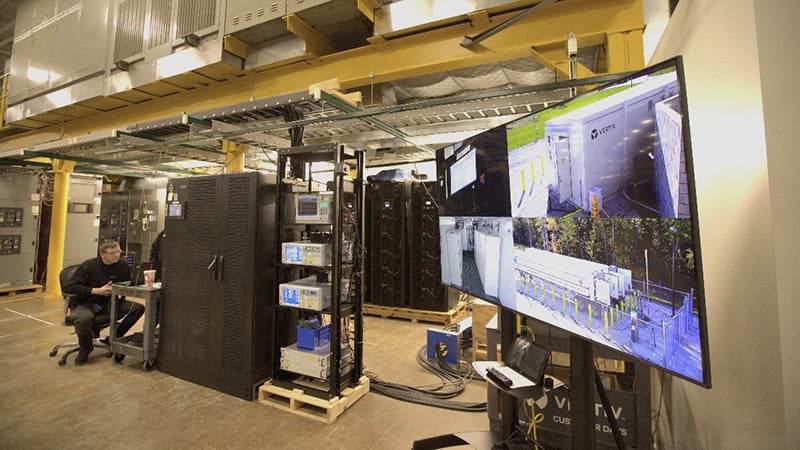
Integrated with fuel cells, Vertiv™ Liebert® EXL S1 becomes a robust backup power supply that ensures continuity during sudden power changes. It can be connected to the grid using Vertiv Dynamic Grid Support Mode, which can also supply energy from the fuel cell to the microgrid while still supporting the critical load. This system can also support grid services, such as frequency regulation and peak shaving.
Additional Advantages With BESS Integration
Integration with Vertiv™ DynaFlex Lithium-ion Battery Energy Storage System (BESS) is also an option that maximizes system efficiency, optimizing power utilization through intelligent control and energy consumption monitoring. The BESS acts as a buffer, absorbing and delivering energy instantly during power transitions. It complements the fuel cell's consistent electrical output for extended periods.
Future Possibilities With Integration of Fuel Cells with UPS
Vertiv Vice President for Global Power Peter Panfil stressed during the event that the data center industry is facing pressing challenges, such as the need for more power as AI and other high-performance computing applications become more prevalent.
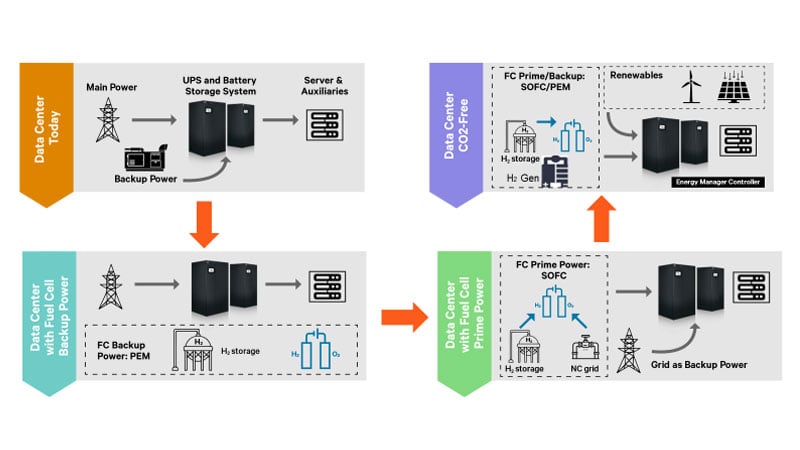
Additionally, global greenhouse gas levels have reached a record high again. According to Panfil, "We have to figure out, number one, how to help decarbonize, and number two, how to get more power for our applications today."
Benefits of Transitioning to Hybrid Solutions
Transitioning towards hybrid solutions with a modernized power system may help firms manage their resources and systematically plan upgrades. The operation of all functions, including future protection, should be considered during this process. The Vertiv™ Liebert® EXL S1, a fuel cell-integrated technology, helps improve the performance of data centers and other mission-critical infrastructures by:
- Providing an unprecedented level of energy reliability with its diverse energy mix and controlled reliance on traditional power grids.
- Promoting optimal energy efficiency with minimized wasted energy due to a reduced reliance on traditional diesel generators.
- Supporting a greener approach to power, as fuel cells generate less CO2 and fewer pollutants than traditional power sources.
- Allowing for precise scaling of power capacity to meet present and future demands without overinvestment due to the modular nature of fuel cells and the versatile design of the UPS.
Switching from diesel generators to UPS systems that support multiple DERs, like the Vertiv™ Liebert® EXL S1, can help data centers and businesses reduce their reliance on fossil fuels and decrease their carbon footprint. By combining different power sources, these systems help ensure that clients and stakeholders experience uninterrupted and reliable uptimes.
Pioneering Low-Carbon Power Practices in Data Centers
As the data center industry intensifies its search for more eco-friendly solutions, the focus on novel innovations to curb carbon emissions is sharper than ever. Researchers and engineers are pioneering advancements that aim to bolster existing infrastructure while setting new standards for energy efficiency.
In Europe, Vertiv is part of a consortium of seven companies -- Equinix, InfraPrime, RISE, Snam, SolydEra, and TEC4FUELS -- that will explore integrating UPS and solid-oxide fuel cell integration as part of the EcoEdge PrimePower (E2P2) by the European Union (EU). This initiative aims to develop low-environmental impact fuel cells for data centers and reduce carbon emissions from operations by up to 100 percent providing economic and resilient prime power solutions. The Clean Hydrogen Partnership will provide EUR 2.5 million to help fund this project.
Conclusion
Vertiv's new Customer Experience Center in Delaware, OH features multiple local energy sources as an "always on" microgrid. This center is crucial in resolving industry challenges amidst rising demands and limited power sources. It not only serves as a customer experience center but also a test lab for performance, helping customers make critical decisions on the compatibility of fuel cell-integrated UPS and microgrids to their data centers.
Showcasing innovation, customer interaction, and education, Vertiv's Delaware Customer Experience Center demonstrates the practical application of distributed energy resources, microgrids, and energy storage systems. With a proactive approach and dedication to advancing technology, Vertiv empowers businesses to reduce reliance on traditional grids and promote sustainability. The Delaware Center helps set the stage for a more sustainable future in power supply solutions.
White Paper: Evaluating the Potential of Fuel Cells for Data Center Power
Discover the future of data center power solutions by exploring our white paper, "Evaluating the Potential of Fuel Cells for Data Center Power." This guide analyzes fuel cell types, their data center applications, technology advancements, facility architecture for fuel cells, and their reliability as backup power.



